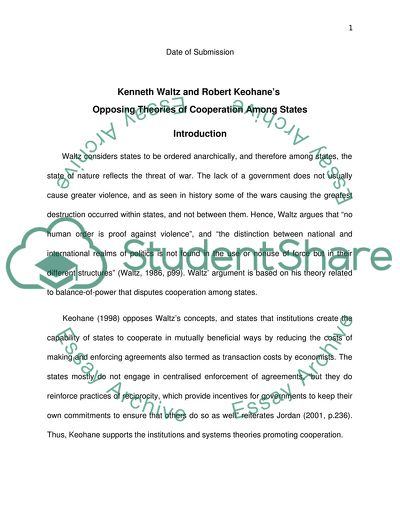Cite this document
(Kenneth Waltz and Robert Keohanes Opposing Theories of Cooperation Literature review, n.d.)
Kenneth Waltz and Robert Keohanes Opposing Theories of Cooperation Literature review. https://studentshare.org/politics/1790506-discuss-in-1500-words-why-kenneth-waltzs-theory-does-not-predict-cooperation-among-states-and-explain-why-and-under-what-conditions-robert-keohanes-theory-does-predict-that-cooperation-will-take-place-which-of-the-two-accounts-is-empirically-mo
Kenneth Waltz and Robert Keohanes Opposing Theories of Cooperation Literature review. https://studentshare.org/politics/1790506-discuss-in-1500-words-why-kenneth-waltzs-theory-does-not-predict-cooperation-among-states-and-explain-why-and-under-what-conditions-robert-keohanes-theory-does-predict-that-cooperation-will-take-place-which-of-the-two-accounts-is-empirically-mo
(Kenneth Waltz and Robert Keohanes Opposing Theories of Cooperation Literature Review)
Kenneth Waltz and Robert Keohanes Opposing Theories of Cooperation Literature Review. https://studentshare.org/politics/1790506-discuss-in-1500-words-why-kenneth-waltzs-theory-does-not-predict-cooperation-among-states-and-explain-why-and-under-what-conditions-robert-keohanes-theory-does-predict-that-cooperation-will-take-place-which-of-the-two-accounts-is-empirically-mo.
Kenneth Waltz and Robert Keohanes Opposing Theories of Cooperation Literature Review. https://studentshare.org/politics/1790506-discuss-in-1500-words-why-kenneth-waltzs-theory-does-not-predict-cooperation-among-states-and-explain-why-and-under-what-conditions-robert-keohanes-theory-does-predict-that-cooperation-will-take-place-which-of-the-two-accounts-is-empirically-mo.
“Kenneth Waltz and Robert Keohanes Opposing Theories of Cooperation Literature Review”. https://studentshare.org/politics/1790506-discuss-in-1500-words-why-kenneth-waltzs-theory-does-not-predict-cooperation-among-states-and-explain-why-and-under-what-conditions-robert-keohanes-theory-does-predict-that-cooperation-will-take-place-which-of-the-two-accounts-is-empirically-mo.


